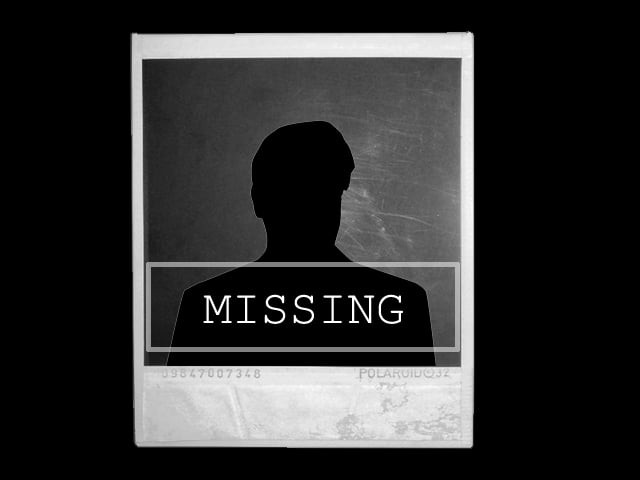Enforced disappearances: As another panel wraps up, families still bereft of answers
None of the old police officers from the cases have recorded their statements.

The judicial commission formed on enforced disappearances wrapped up its proceedings on Saturday, taking up nine cases of Muttahida Qaumi Movement members.
A total of 54 enforced disappearances, most from Karachi, were the subject of the proceedings which ran from February 27 to March 3. The commission learnt where 11 people were – 10 have been found and one person was found dead in Quetta.
While the commission was formed by the Supreme Court to be headed by Justice (retired) Javed Iqbal. Though, he did not attend any of the hearings, instead, Sharif Virk, a former Inspector general of Khyber-Pakhtunkhwa, did the work.
For the past three days, cases of 25 missing persons from the MQM were brought up. These men went missing from 1992 to 1996, and most of them were picked up during the two operations which took place in Karachi.
On the last day, weary families stood outside the National Crisis Management Cell at the Pak Secretariat. They were mostly disappointed that nothing concrete had been shared.
A frail white-bearded Haji Amanullah remembered how his son Saleem Raza, a college student, went missing 18 years ago from North Karachi. “It was a Monday in 1994, the month I don’t remember. Saleem took a bath and put on some fresh clothes. He was going to his grandfather’s house,” said Amanullah. “I told him to come home early because the situation in the city was getting worse” Saleem promised that he would be back by 8pm, but he never made it home. He went missing on the ten-minute walk to his grandfather’s house.
Amanullah searched morgues and hospitals in vain. “The one who should be giving a shoulder to my bier is not here,” cried the 70-year-old man for his only son.
A two-member MQM committee on enforced disappearances was formed in the late 1990s. Babar Anis, who heads it, claims that their people disappeared after being arrested. “These people were picked up from their homes or rounded up in operations,” he said.
While 28 MQM men are said to be missing, FIRs were registered for 25. In three cases, the families either relocated or there was no one to pursue the case.
Babar Anis is someone who knows what it is like to lose a loved one. His brother Gohar along with three friends was arrested allegedly by law enforcement agencies in June 1996 from his sister’s house in Teen Hatti, where he was in hiding. “Even today we have not lost hope,” he said. “My sisters are willing to fight with anyone who says that our brother is dead.” Anis has nominated the then DIG of Karachi, Shoaib Suddle, in his FIR and demanded his arrest. Suddle now holds the post of federal tax ombudsman.
Other people, like Faisal Khan, saw their fathers dragged off. He was only 14 years old at the time but he vividly remembers the night his father Shafi Khan was picked up 20 years ago. “They had put a cloth over his face. I couldn’t save him, there were 16 of them,” said Khan, his eyes welling with tears. His father was a lawyer and ran a printing press. “For years we have been trying to find him. I don’t know when the wait will be over.”
Mukhtar Zaman came for his brother Zafeer Khan who was picked up from his office near Bolton Market some 16 years ago. “We are stuck in limbo. If anyone would tell us that my brother is dead, then we would raise our hands and offer Fateha,” he said. Like many families they simply want to know what has happened, even if their loved one is dead. At least that would mean closure.
With his brother’s case pending in the Supreme Court, Zaman seemed satisfied that the commission has at least directed the then SHO Baharuddin and two police officers to record their statements in the case.
The police who were nominated in the cases have yet to be brought before the commission. Instead, so far, currently posted officers have appeared if the person went missing in their jurisdiction. Among them was Preedy police station’s Ali who was called for the case of Muzammil Hussain. “The aim of the commission is to push the police officers to probe harder and we all are trying to do that,” he said, before leaving without sharing any details. The families told The Express Tribune that the commission had directed police officers to keep the families in the loop.
Nasir Ahmed, whose brother Ashfaque was arrested along with Babar Anis’s brother, said that the commission has also sought an explanation for the statements made by the then interior minister Chaudhry Shujaat, who in 1997 had claimed in the National Assembly that 28 MQM men were killed and their bodies dumped in the Margalla Hills, Islamabad.
“We demand that Shujaat be brought before the commission, and clarify what he said. “We want answers.”
Published in The Express Tribune, March 4th, 2012.


















COMMENTS
Comments are moderated and generally will be posted if they are on-topic and not abusive.
For more information, please see our Comments FAQ